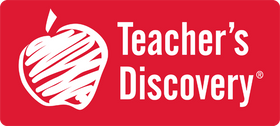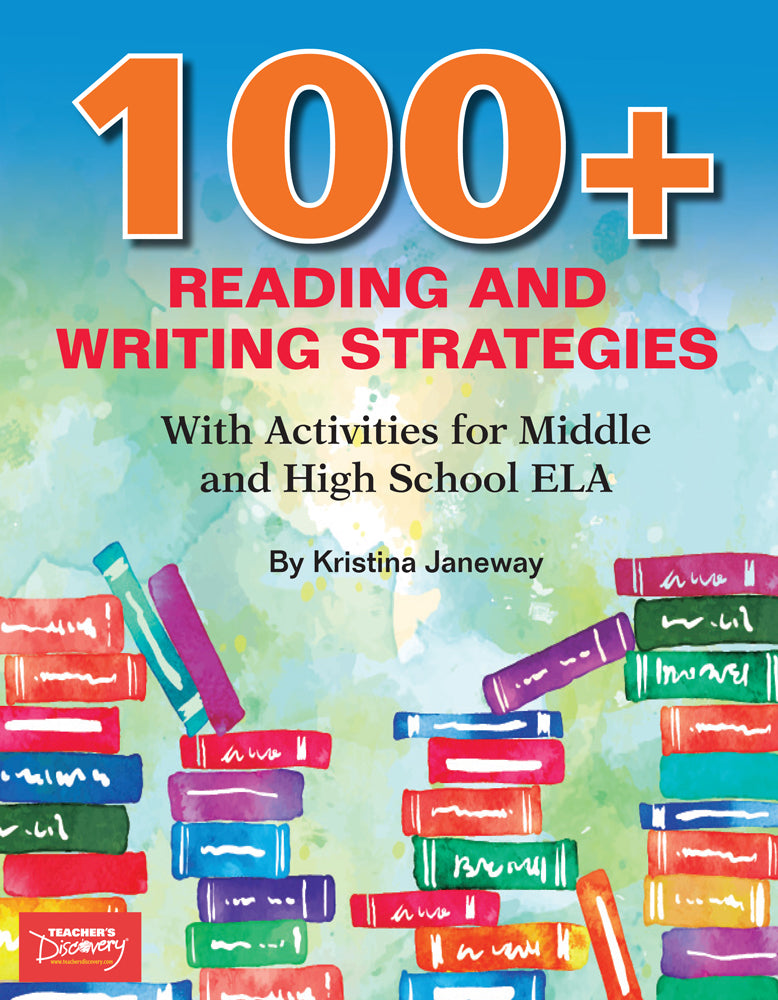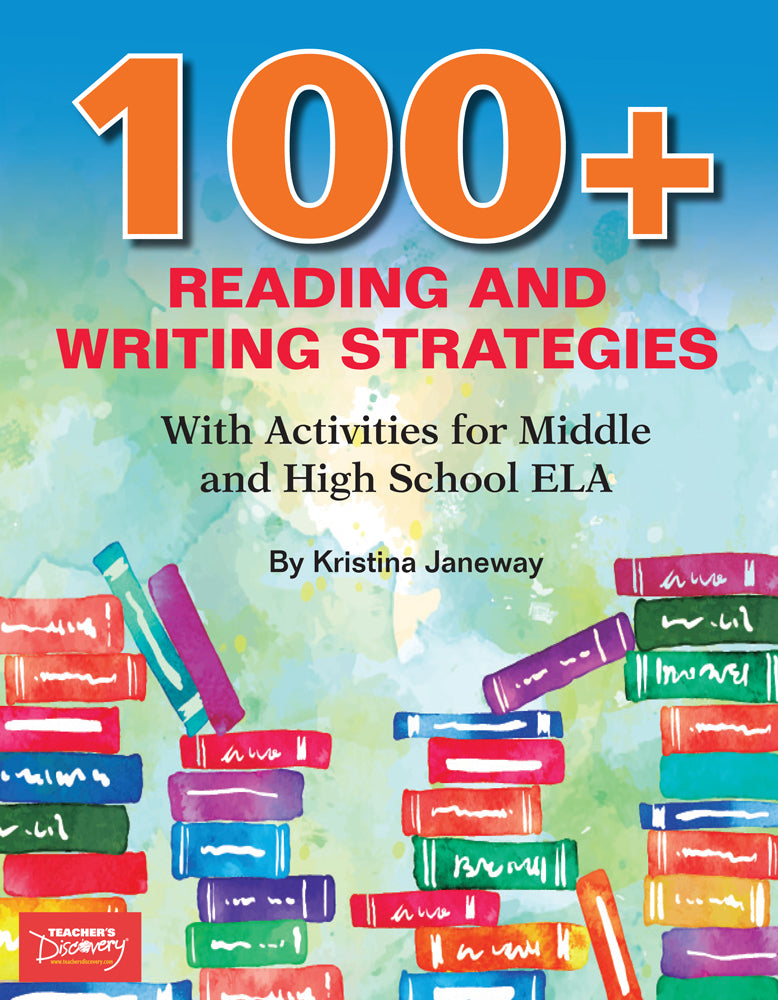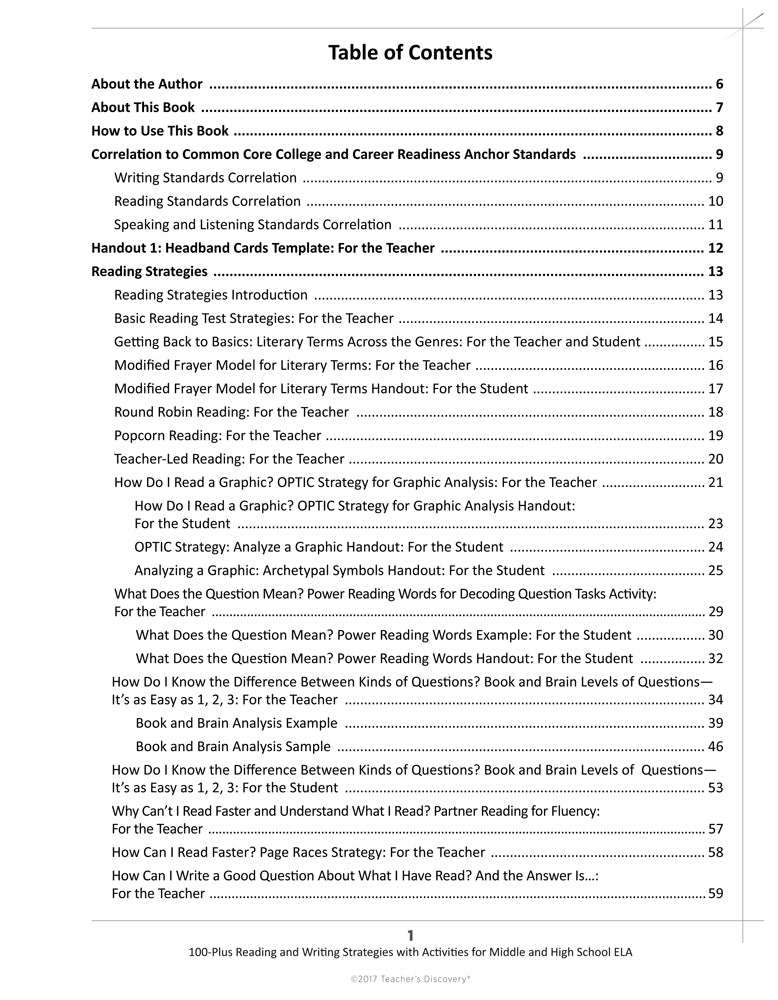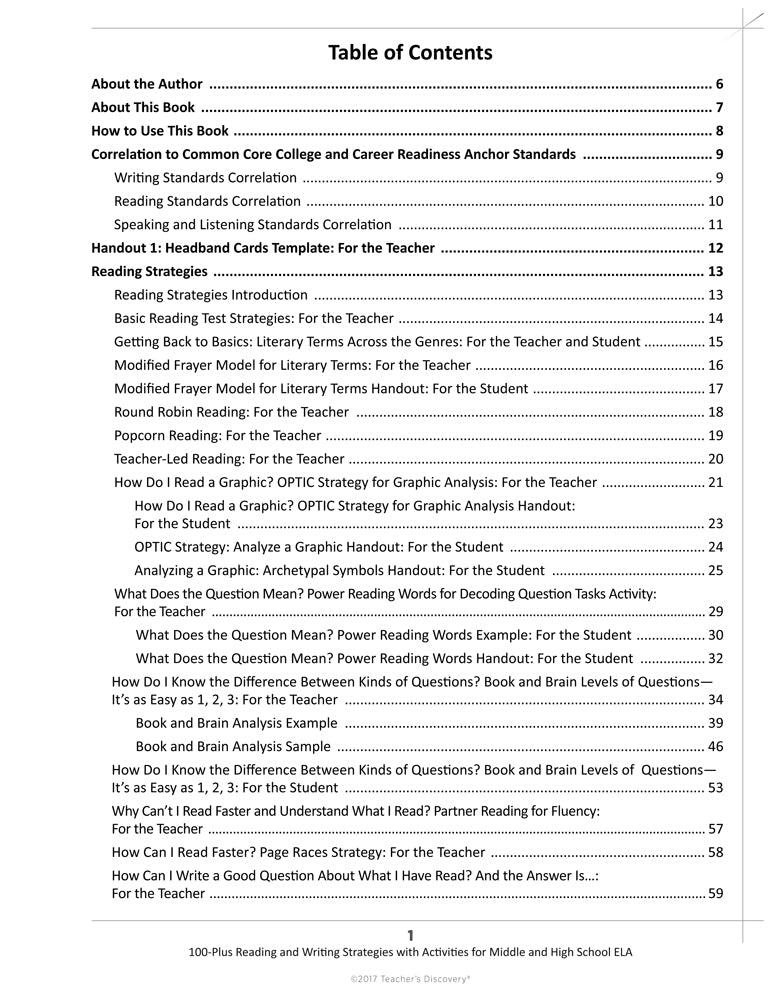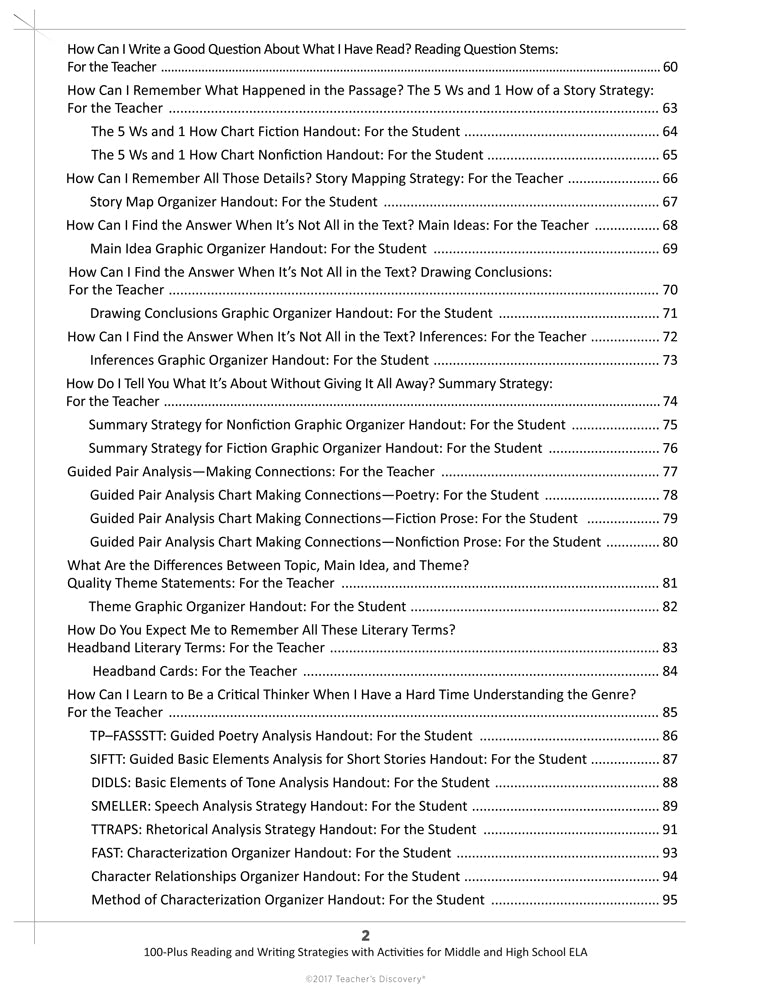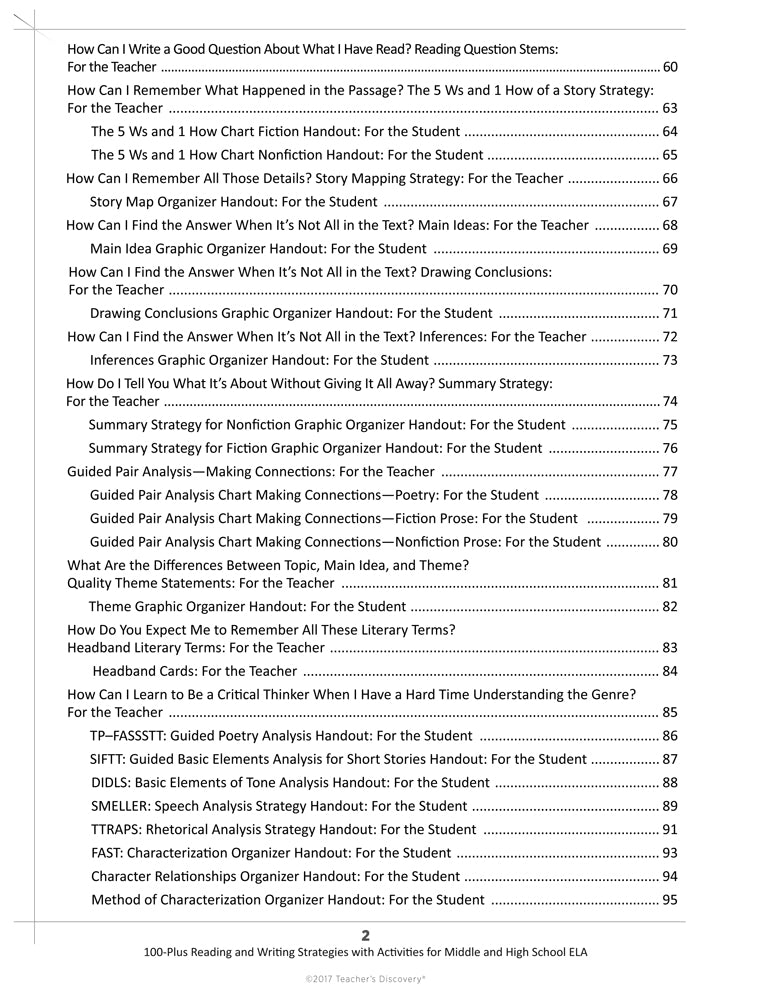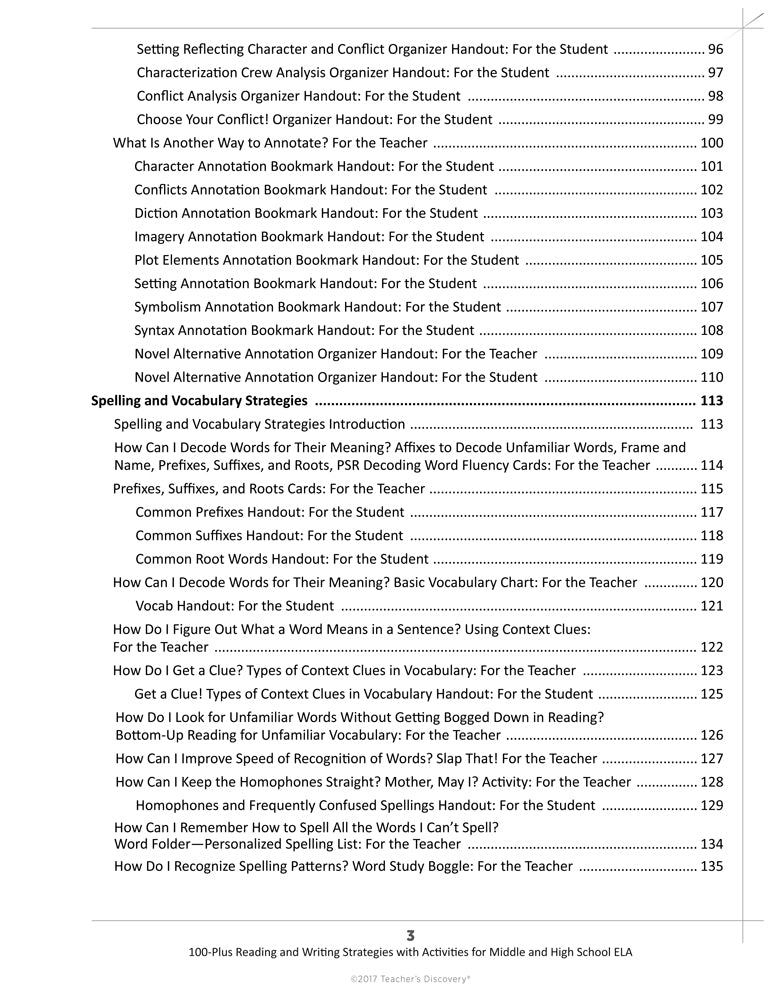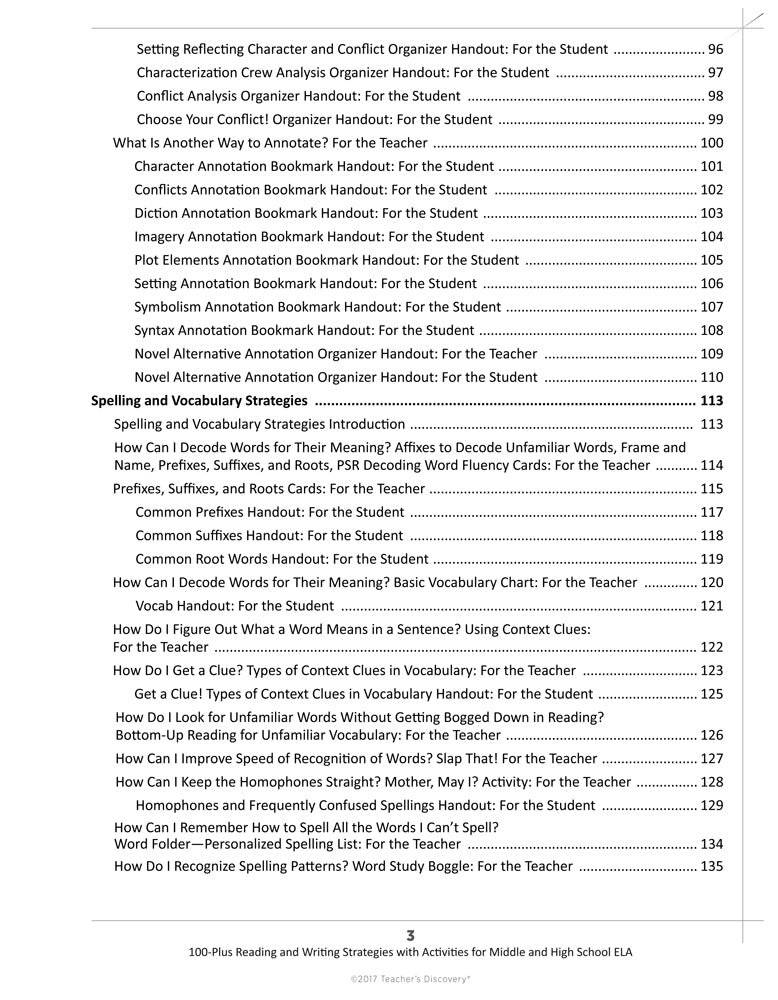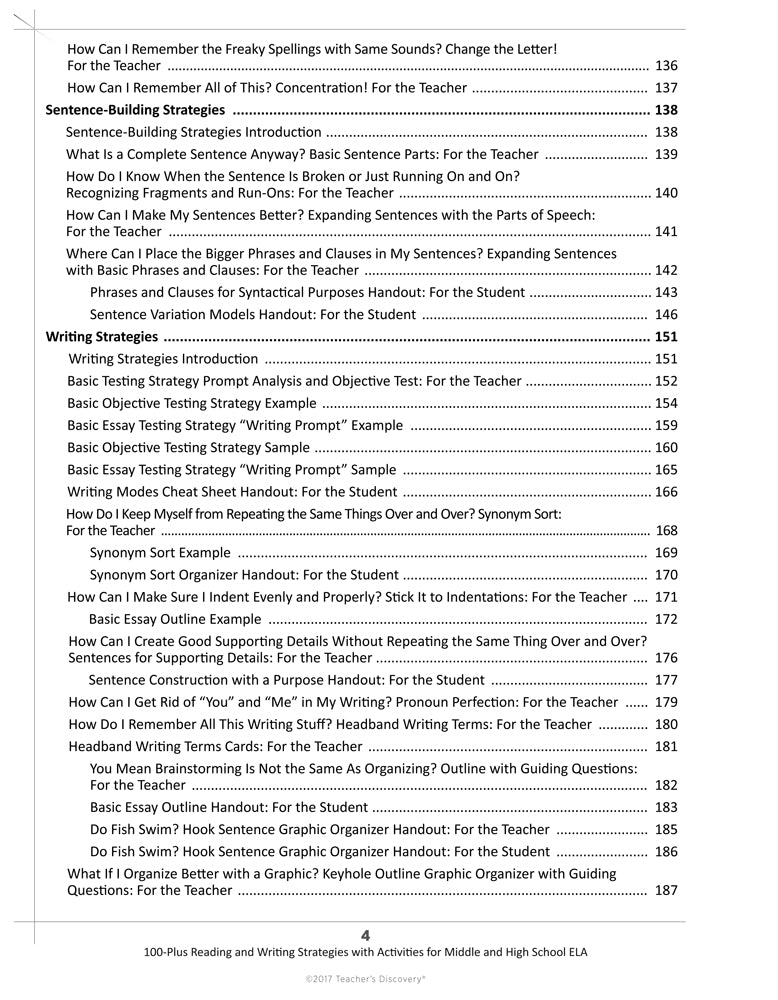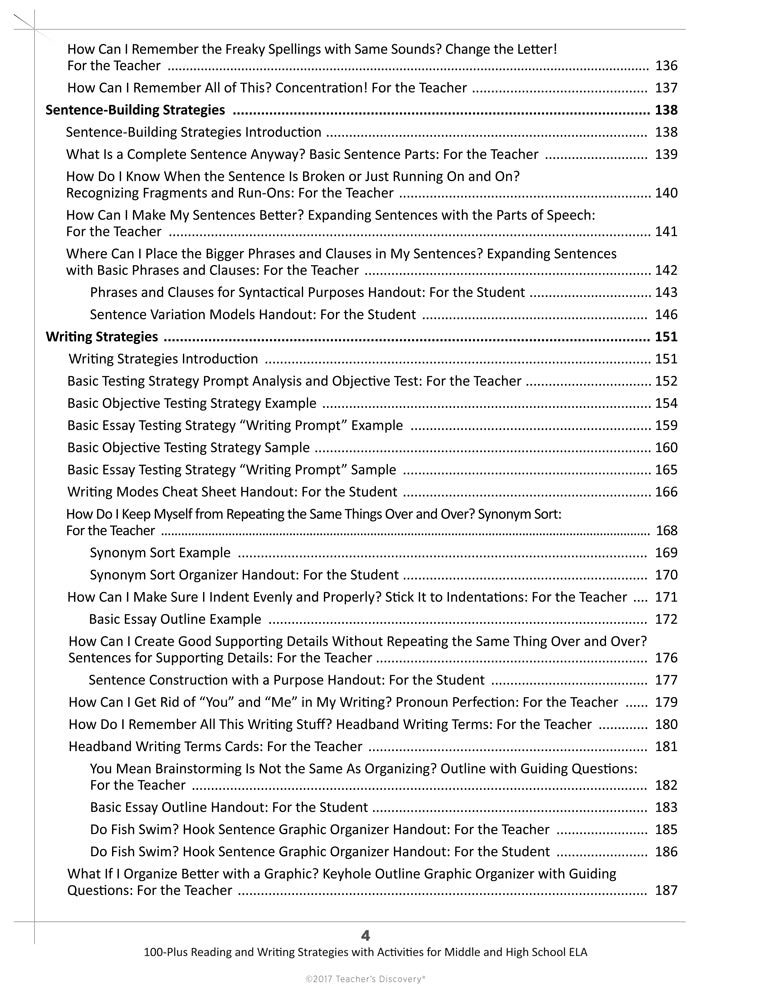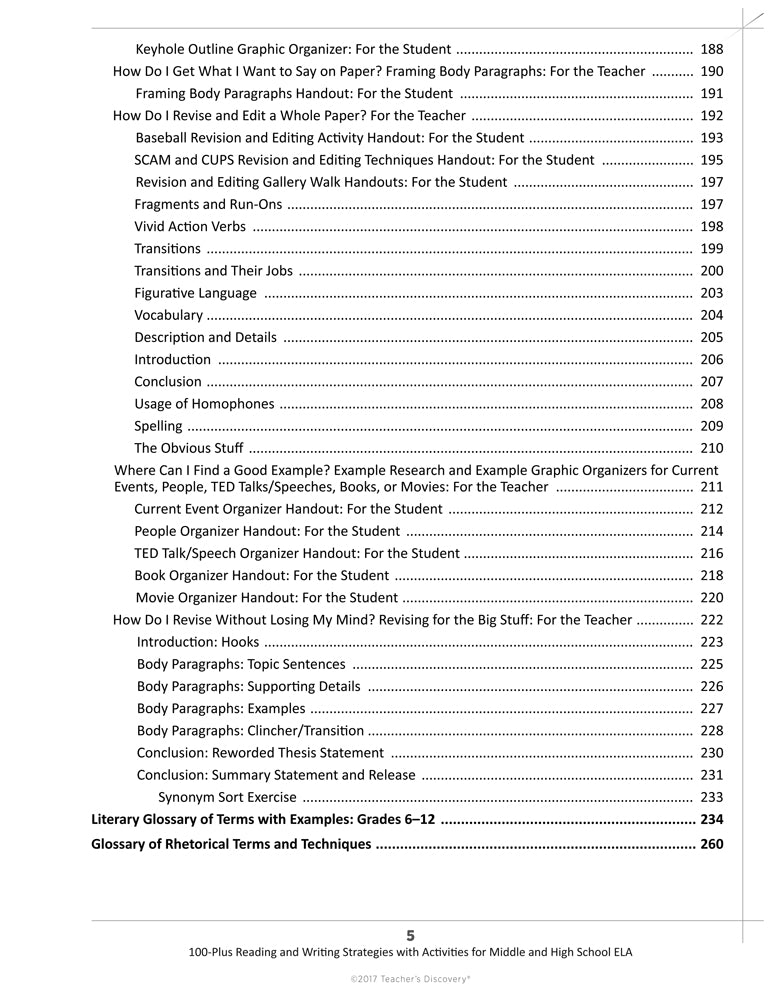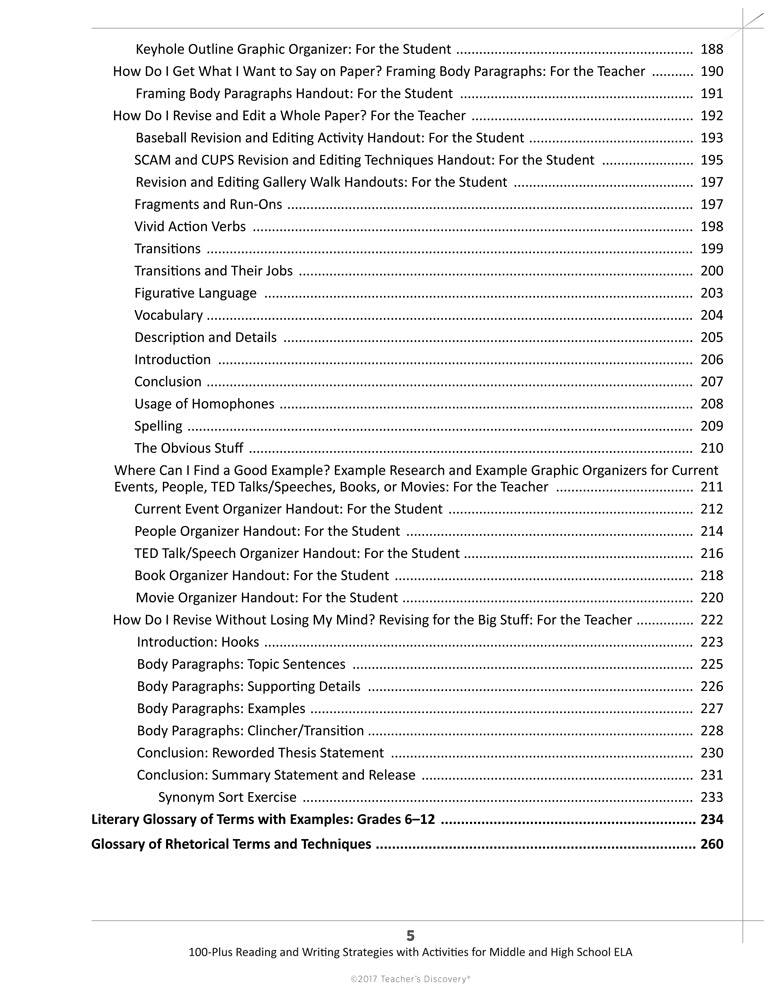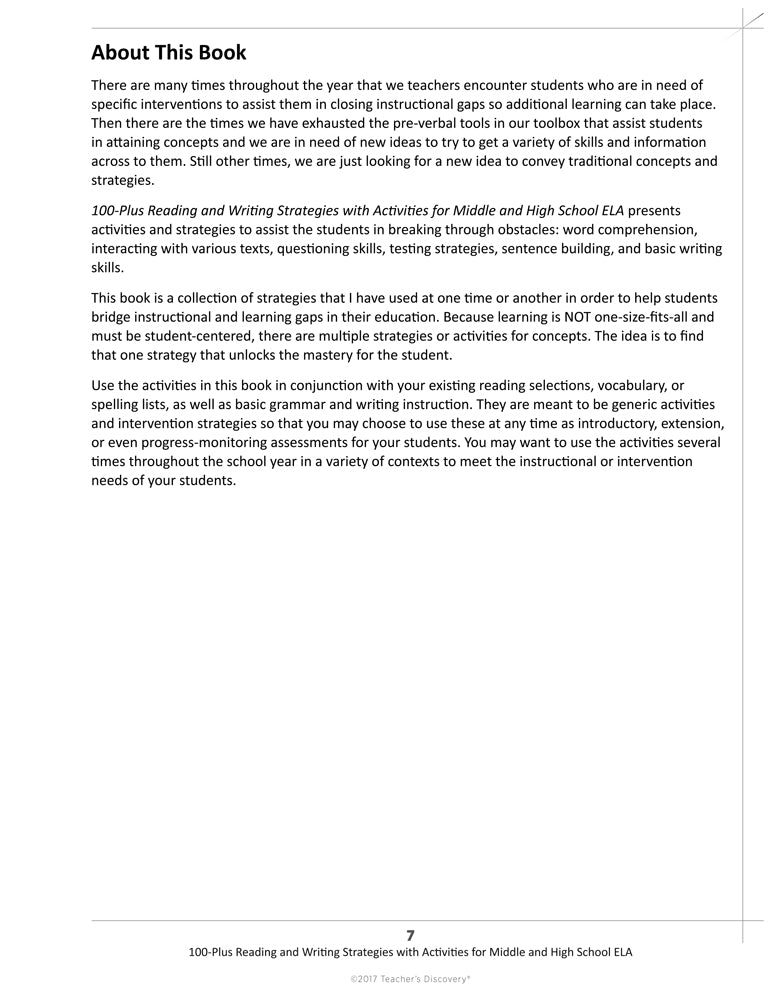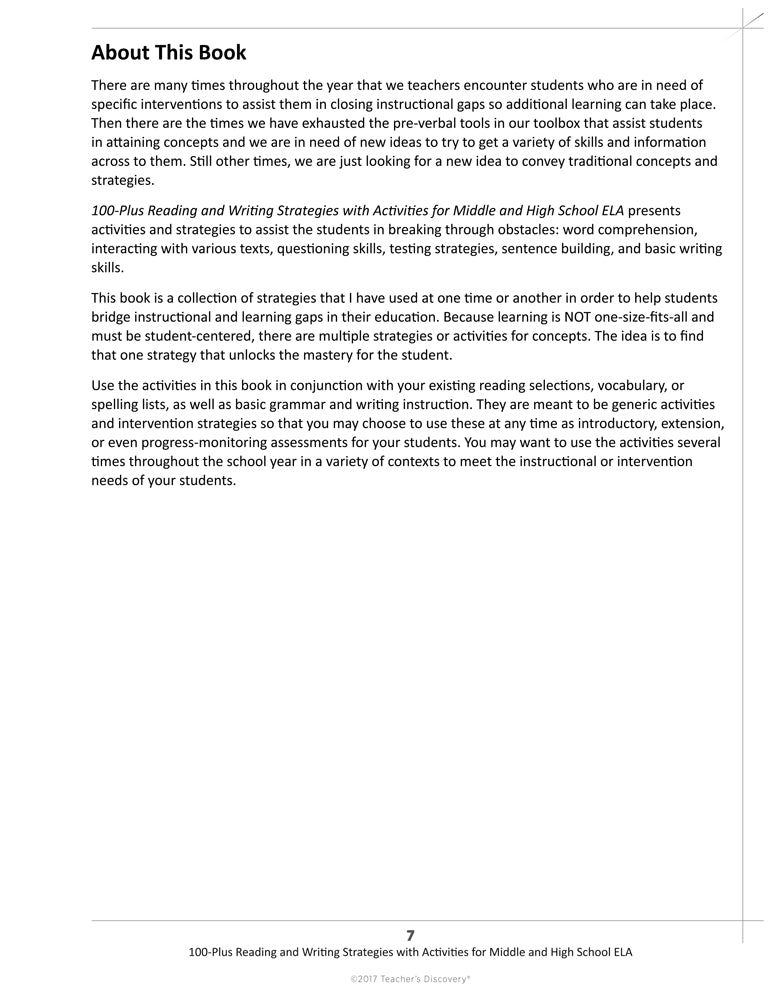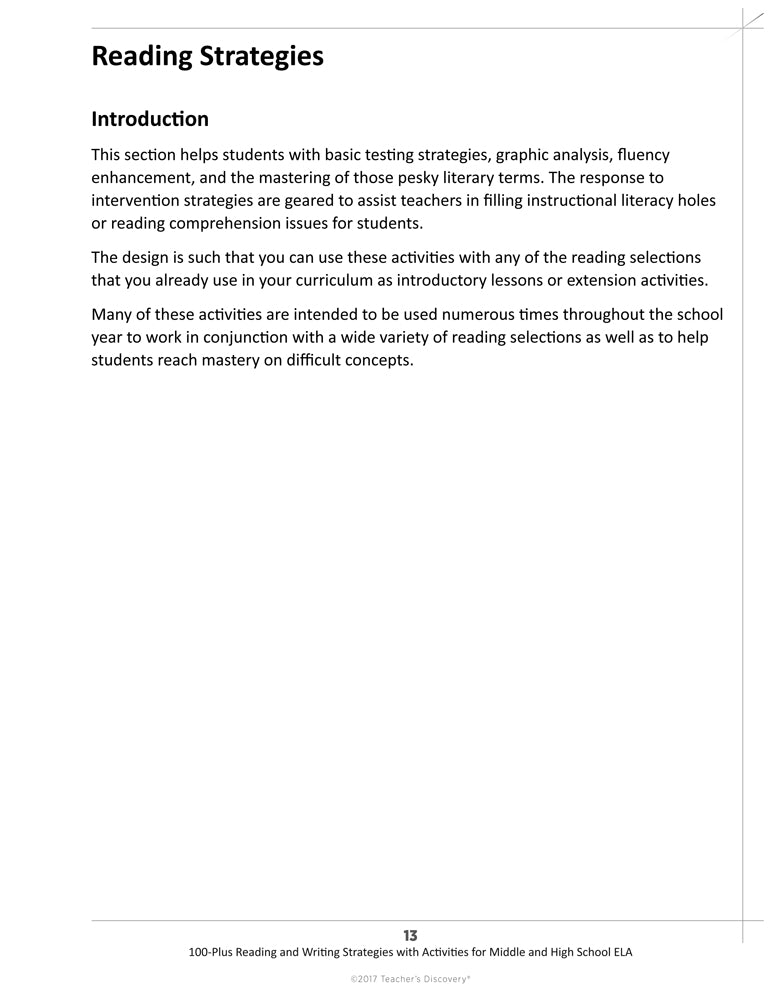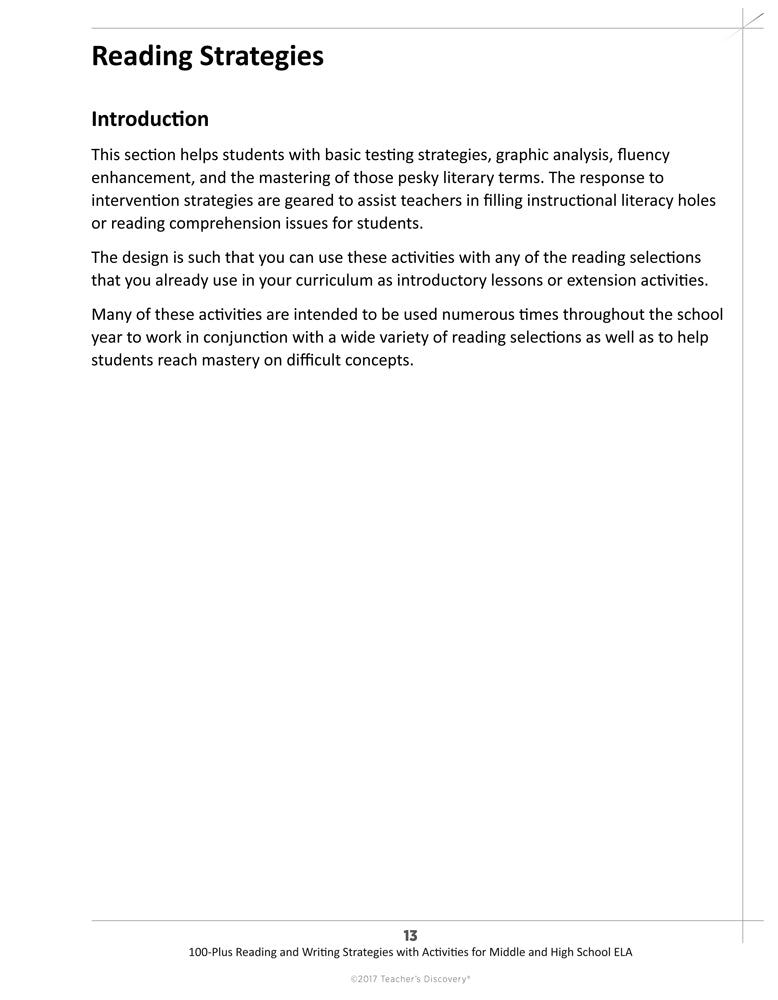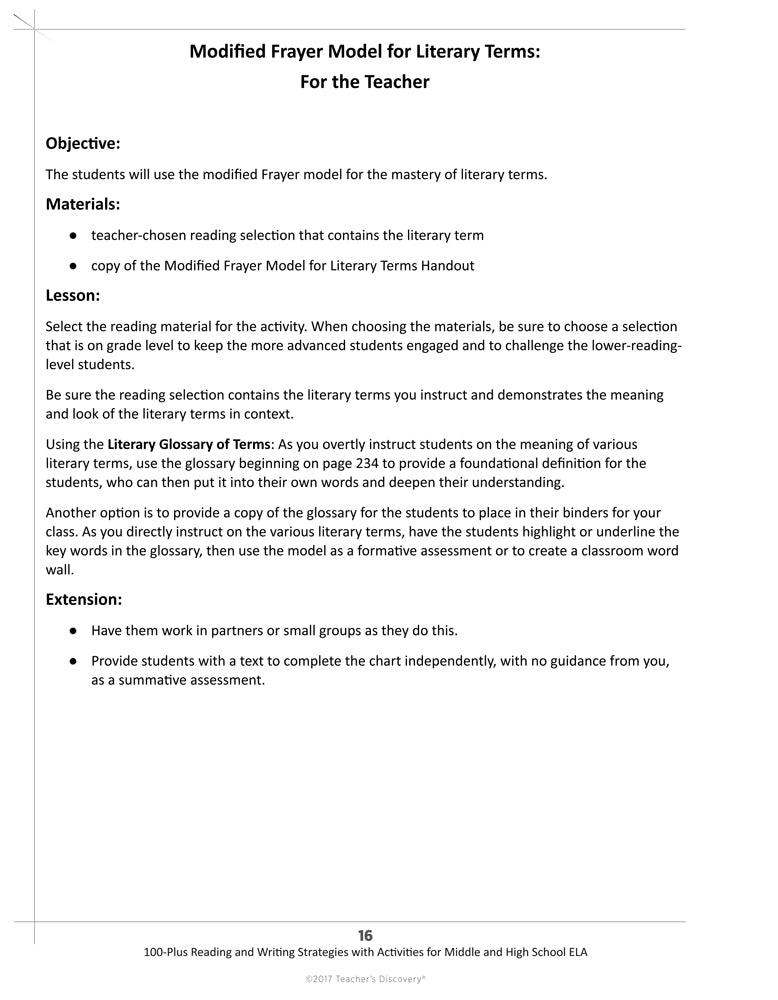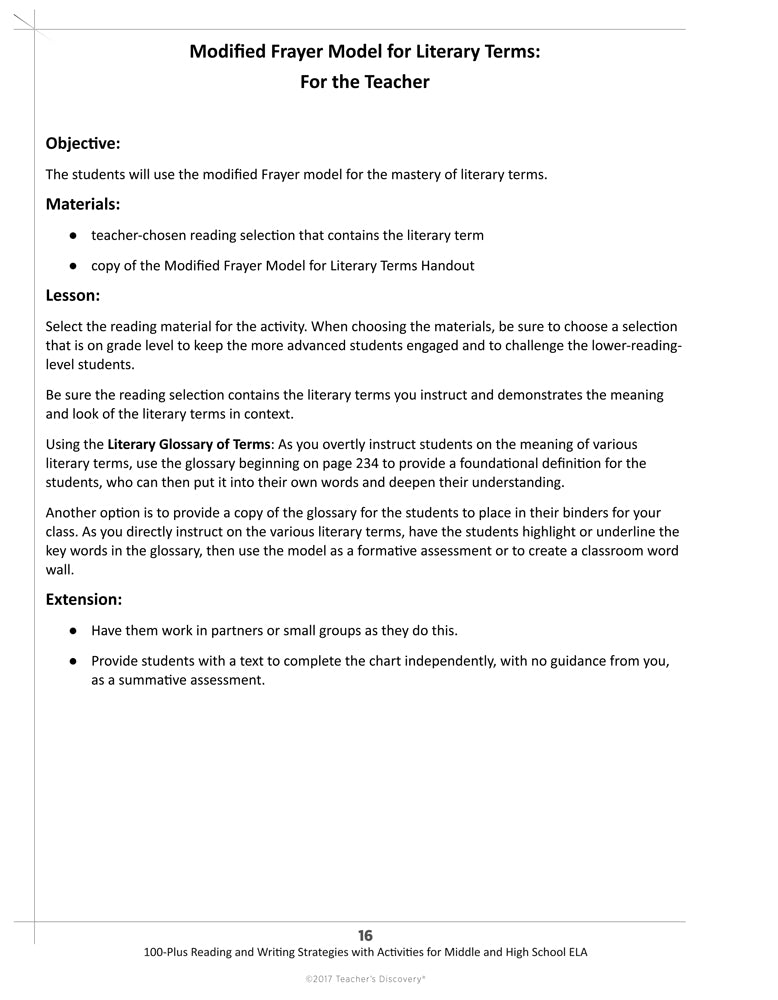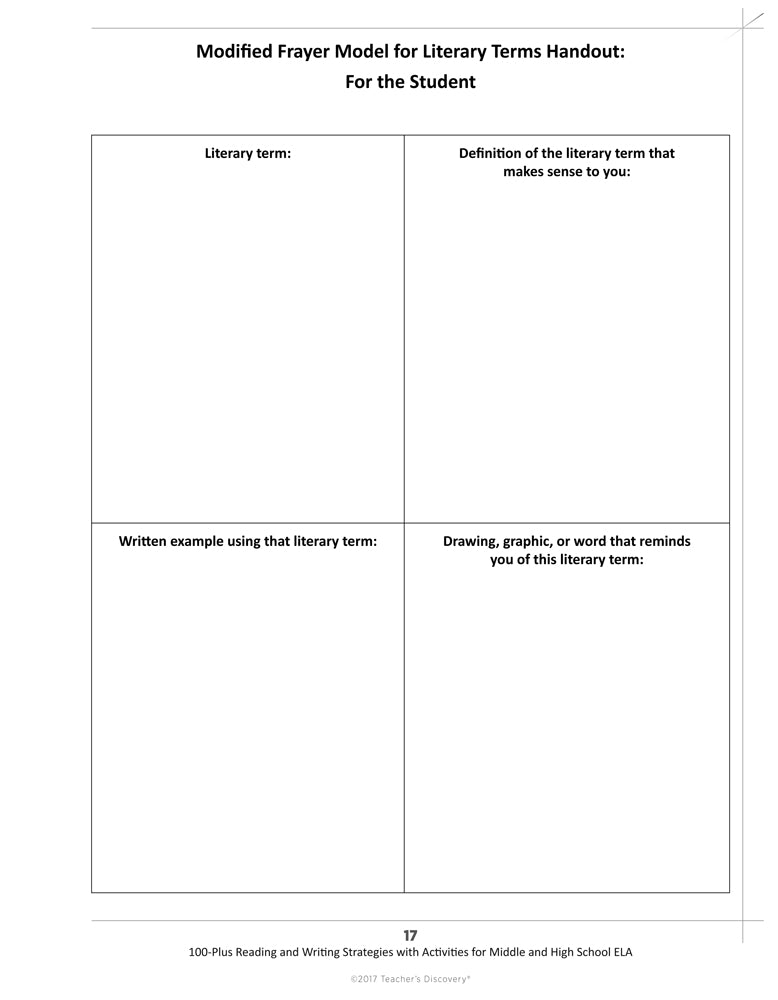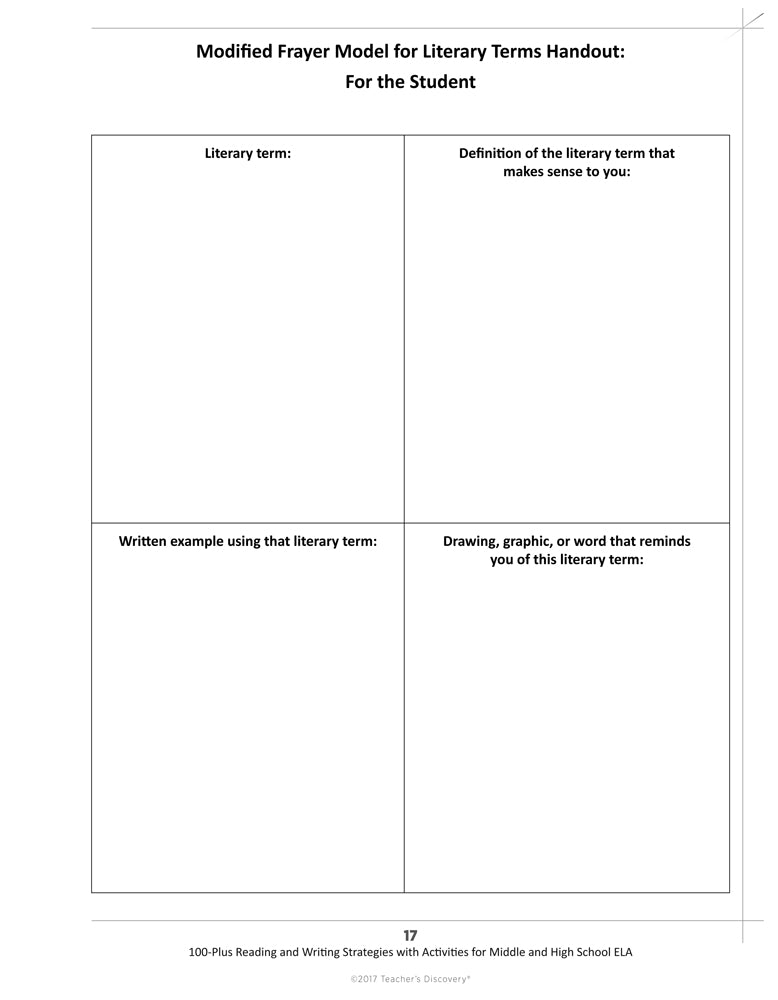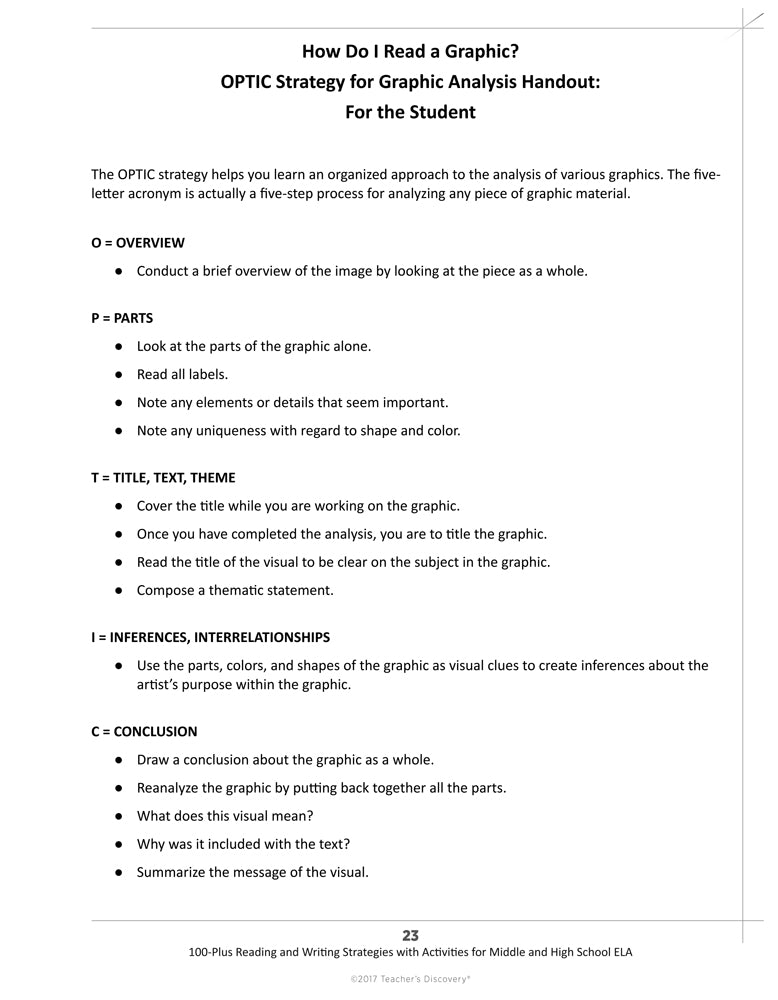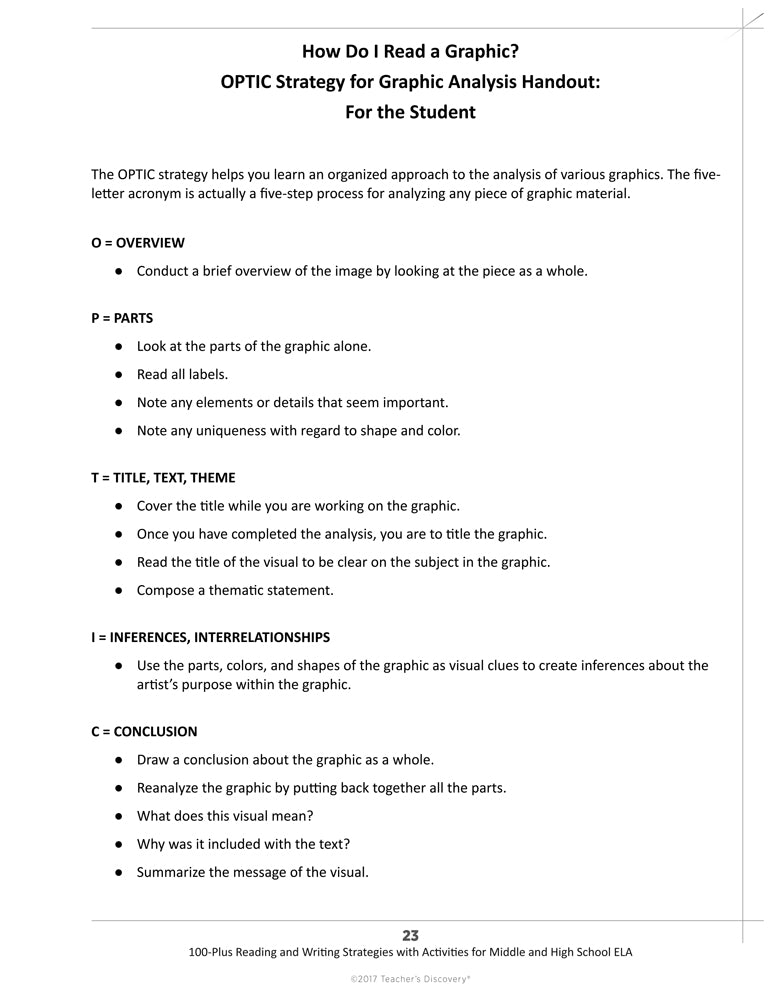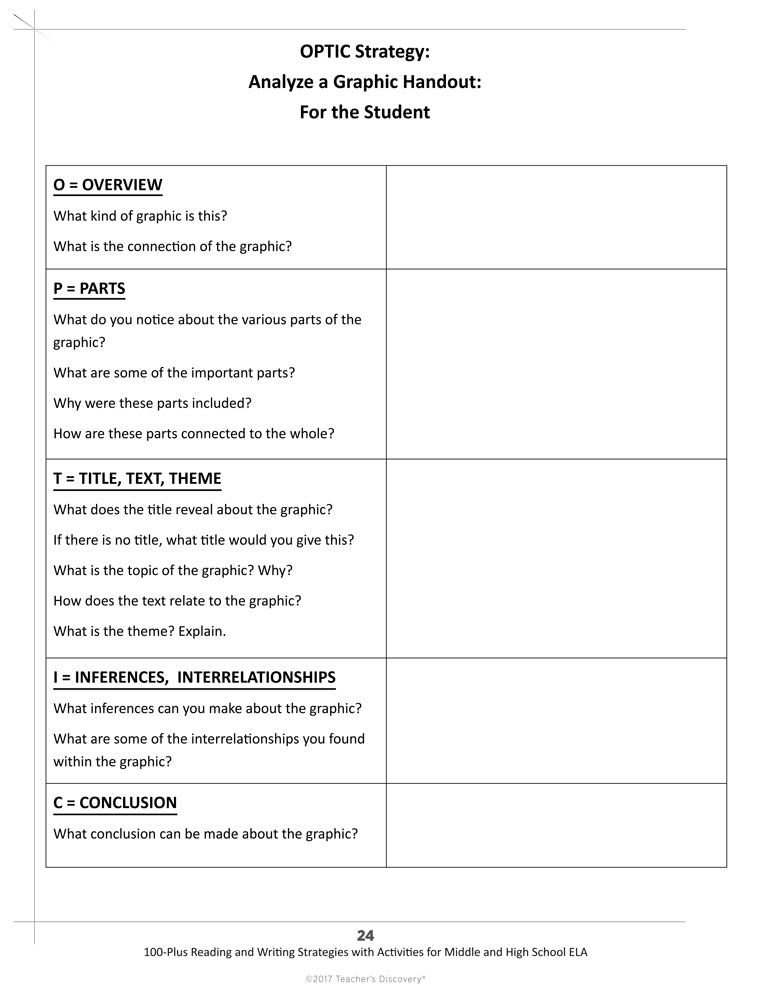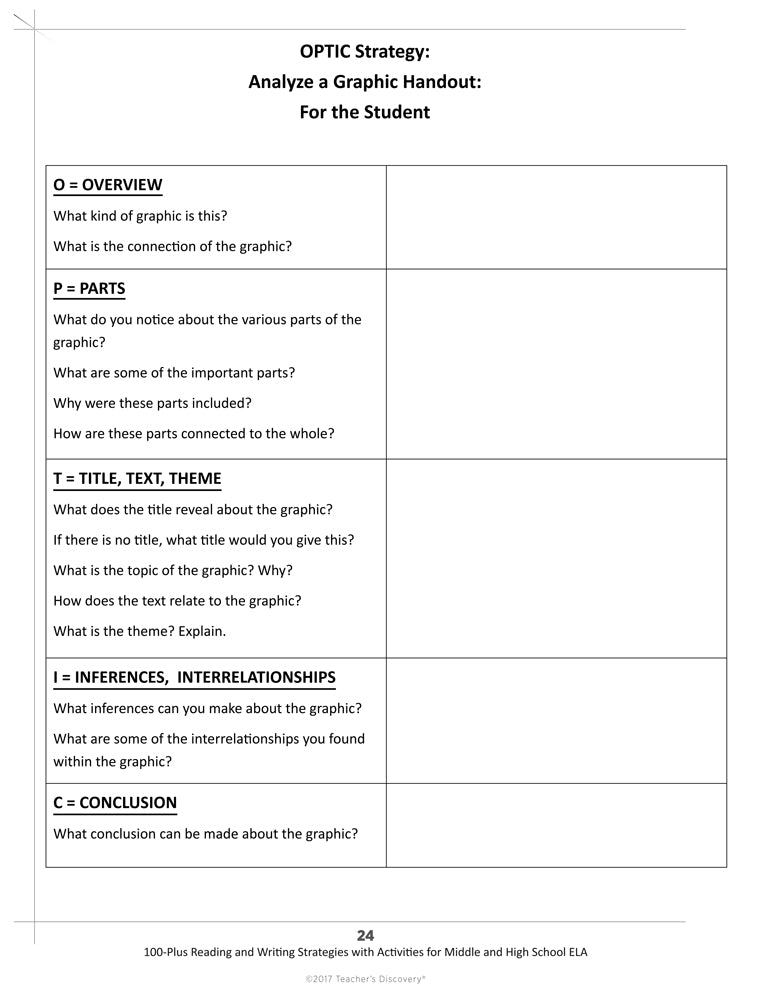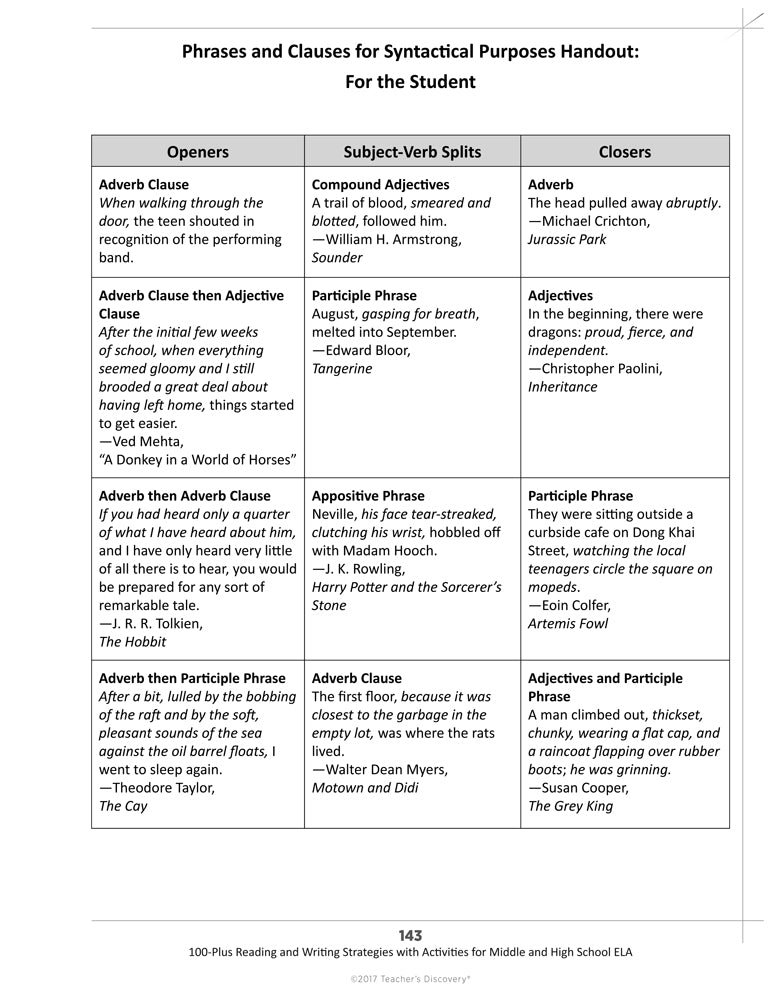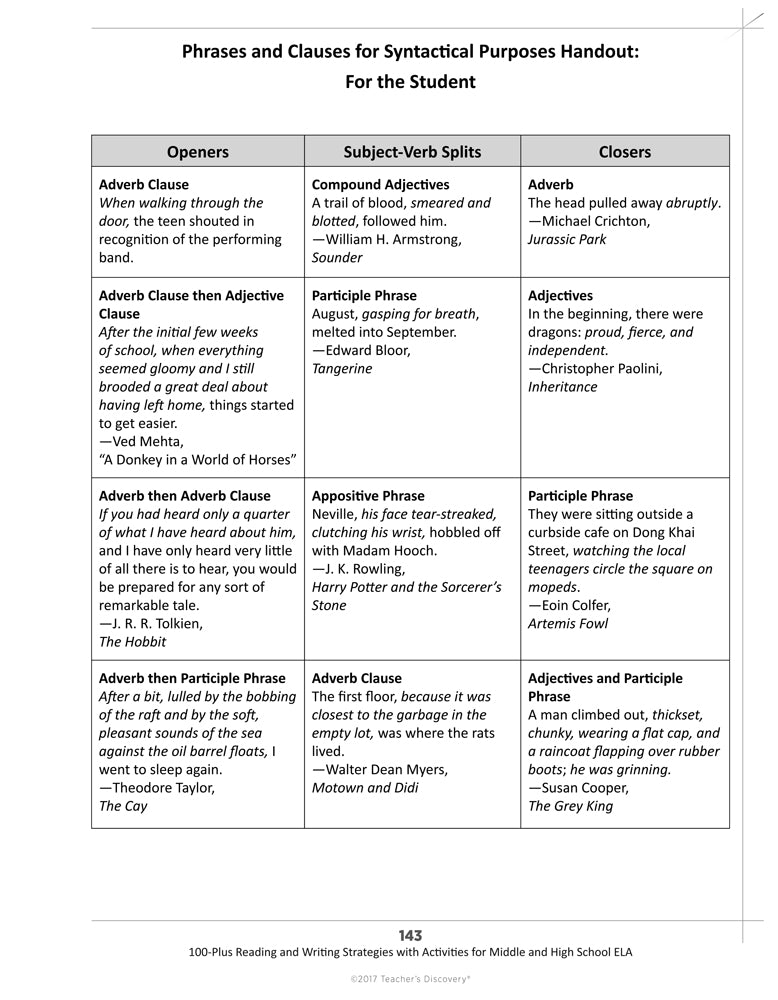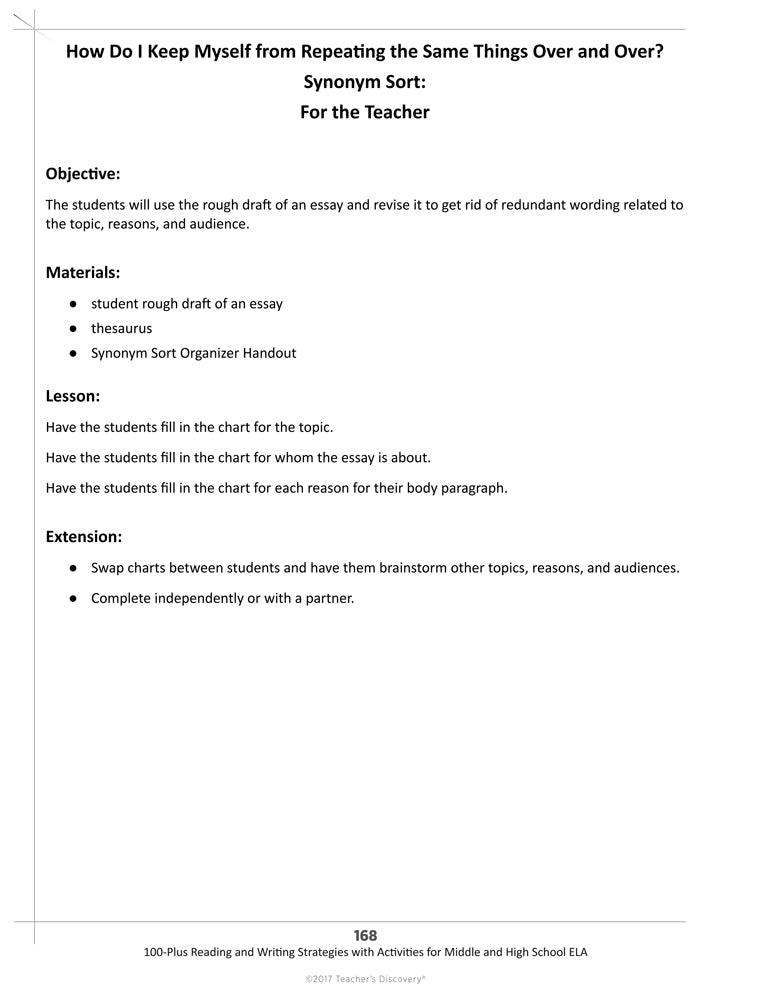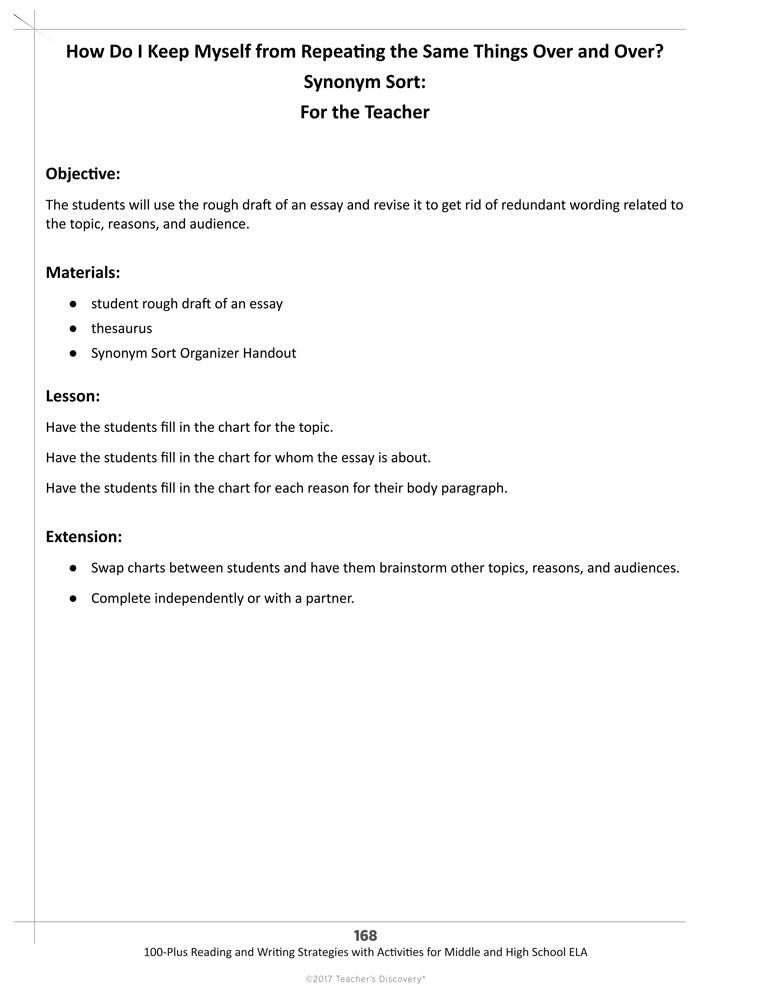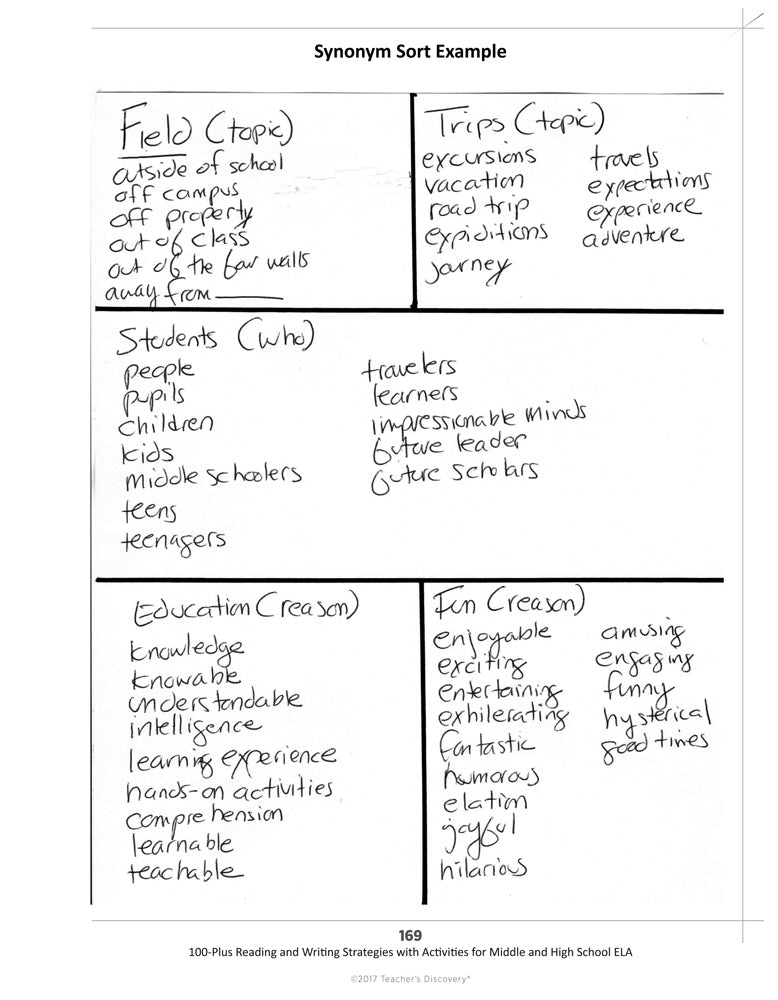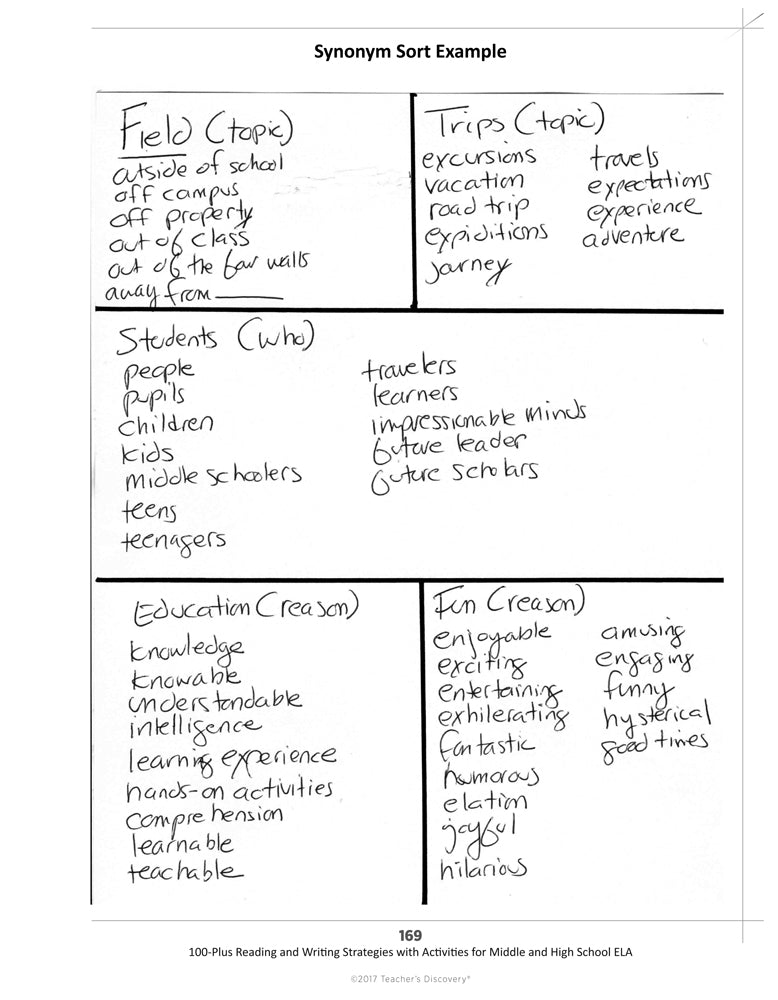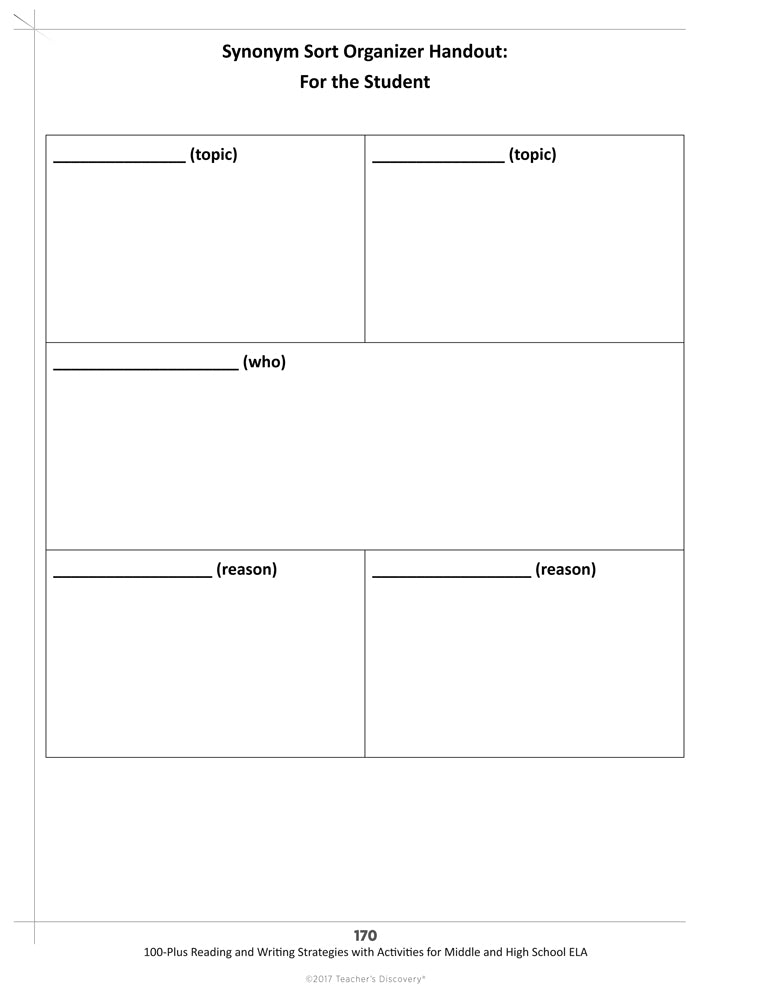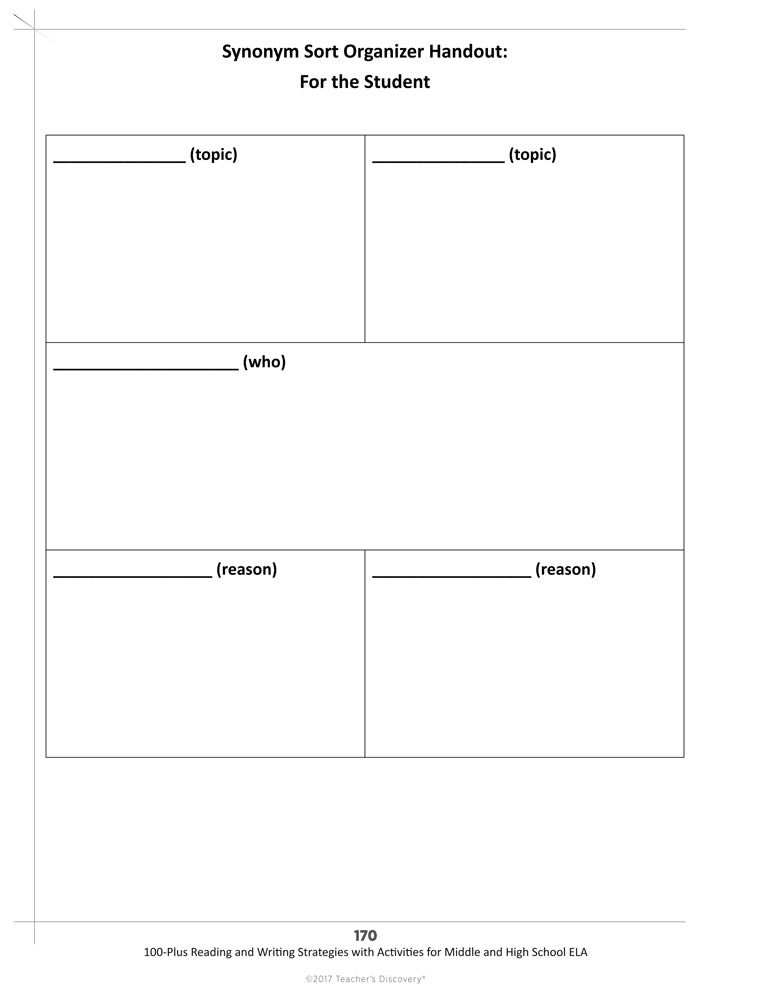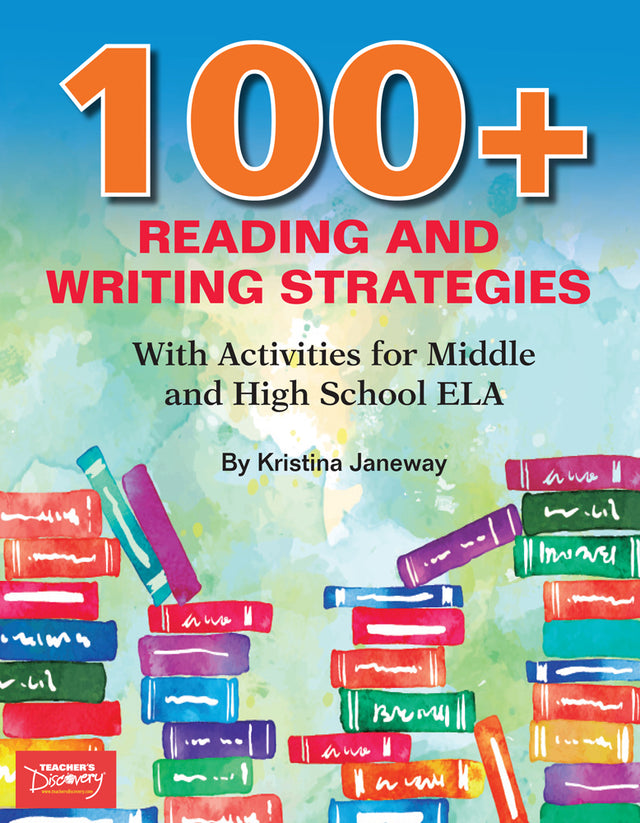The answers to those questions and many more are in 100-Plus Reading and Writing Strategies, a new collection of methods and activities that the author, ELA teacher Kristina Janeway, uses to help students successfully bridge instructional and learning gaps. Includes word comprehension, interacting with various texts, questioning skills, testing strategies, sentence building, and basic writing skills.
100-Plus Reading and Writing Strategies is divided into six sections:
- Reading Strategies
- Spelling and Vocabulary Strategies
- Sentence-Building Strategies
- Writing Strategies
- Literary Glossary of Terms
- Glossary of Rhetorical Terms and Techniques
The Reading, Spelling and Vocabulary, Sentence-Building, and Writing sections are structured into a “For the Teacher” instructional page and a “For the Student” handout or organizer that corresponds to the activity. Handouts are reproducible.
Activities have step-by-step instructions for a suggested lesson as well as alternative implementations or extensions to enhance the activity and allow more use as a student gains academic strength in the area of concern.
Table of Contents
About This Book
How to Use This Book
Correlation to Common Core College and Career Readiness Anchor Standards
- Writing Standards Correlation
- Reading Standards Correlation
- Speaking and Listening Standards Correlation
Reading Strategies
- Reading Strategies Introduction
- Basic Reading Test Strategies: For the Teacher
- Getting Back to Basics: Literary Terms Across the Genres: For the Teacher and Student
- Modified Frayer Model for Literary Terms: For the Teacher
- Modified Frayer Model for Literary Terms Handout: For the Student
- Round Robin Reading: For the Teacher
- Popcorn Reading: For the Teacher
- Teacher-Led Reading: For the Teacher
- How Do I Read a Graphic? OPTIC Strategy for Graphic Analysis: For the Teacher
- How Do I Read a Graphic? OPTIC Strategy for Graphic Analysis Handout: For the Student
- OPTIC Strategy: Analyze a Graphic Handout: For the Student
- Analyzing a Graphic: Archetypal Symbols Handout: For the Student
- What Does the Question Mean? Power Reading Words for Decoding Question Tasks Activity: For the Teacher
- What Does the Question Mean? Power Reading Words Example: For the Student
- What Does the Question Mean? Power Reading Words Handout: For the Student
- How Do I Know the Difference Between Kinds of Questions? Book and Brain Levels of Questions--It's as Easy as 1, 2, 3: For the Teacher
- Book and Brain Analysis Example
- Book and Brain Analysis Sample
- How Do I Know the Difference Between Kinds of Questions? Book and Brain Levels of Questions--It's as Easy as 1, 2, 3: For the Student
- Why Can't I Read Faster and Understand What I Read? Partner Reading for Fluency: For the Teacher
- How Can I Read Faster? Page Races Strategy: For the Teacher
- How Can I Write a Good Question About What I Have Read? And the Answer Is: For the Teacher
- How Can I Write a Good Question About What I Have Read? Reading Question Stems: For the Teacher
- How Can I Remember What Happened in the Passage? The 5 Ws and 1 How of a Story Strategy: For the Teacher
- The 5 Ws and 1 How Chart Fiction Handout: For the Student
- The 5 Ws and 1 How Chart Nonfiction Handout: For the Student
- How Can I Remember All Those Details? Story Mapping Strategy: For the Teacher
- Story Map Organizer Handout: For the Student
- How Can I Find the Answer When It's Not All in the Text? Main Ideas: For the Teacher
- Main Idea Graphic Organizer Handout: For the Student
- How Can I Find the Answer When It's Not All in the Text? Drawing Conclusions: For the Teacher
- Drawing Conclusions Graphic Organizer Handout: For the Student
- How Can I Find the Answer When It's Not All in the Text? Inferences: For the Teacher
- Inferences Graphic Organizer Handout: For the Student
- How Do I Tell You What It's About Without Giving It All Away? Summary Strategy: For the Teacher
- Summary Strategy for Nonfiction Graphic Organizer Handout: For the Student
- Summary Strategy for Fiction Graphic Organizer Handout: For the Student
- Guided Pair Analysis--Making Connections: For the Teacher
- Guided Pair Analysis Chart Making Connections--Poetry: For the Student
- Guided Pair Analysis Chart Making Connections--Fiction Prose: For the Student
- Guided Pair Analysis Chart Making Connections--Nonfiction Prose: For the Student
- What Are the Differences Between Topic, Main Idea, and Theme? Quality Theme Statements: For the Teacher
- Theme Graphic Organizer Handout: For the Student
- How Do You Expect Me to Remember All These Literary Terms? Headband Literary Terms: For the Teacher
- Headband Cards: For the Teacher
- How Can I Learn to Be a Critical Thinker When I Have a Hard Time Understanding the Genre? For the Teacher
- TP-FASSSTT: Guided Poetry Analysis Handout: For the Student
- SIFTT: Guided Basic Elements Analysis for Short Stories Handout: For the Student
- DIDLS: Basic Elements of Tone Analysis Handout: For the Student
- SMELLER: Speech Analysis Strategy Handout: For the Student
- TTRAPS: Rhetorical Analysis Strategy Handout: For the Student
- FAST: Characterization Organizer Handout: For the Student
- Character Relationships Organizer Handout: For the Student
- Method of Characterization Organizer Handout: For the Student
- Setting Reflecting Character and Conflict Organizer Handout: For the Student
- Characterization Crew Analysis Organizer Handout: For the Student
- Conflict Analysis Organizer Handout: For the Student
- Choose Your Conflict! Organizer Handout: For the Student
- What Is Another Way to Annotate? For the Teacher
- Character Annotation Bookmark Handout: For the Student
- Conflicts Annotation Bookmark Handout: For the Student
- Diction Annotation Bookmark Handout: For the Student
- Imagery Annotation Bookmark Handout: For the Student
- Plot Elements Annotation Bookmark Handout: For the Student
- Setting Annotation Bookmark Handout: For the Student
- Symbolism Annotation Bookmark Handout: For the Student
- Syntax Annotation Bookmark Handout: For the Student
- Novel Alternative Annotation Organizer Handout: For the Teacher
- Novel Alternative Annotation Organizer Handout: For the Student
- Spelling and Vocabulary Strategies Introduction
- How Can I Decode Words for Their Meaning? Affixes to Decode Unfamiliar Words, Frame and Name, Prefixes, Suffixes, and Roots, PSR Decoding Word Fluency Cards: For the Teacher
- Prefixes, Suffixes, and Roots Cards: For the Teacher
- Common Prefixes Handout: For the Student
- Common Suffixes Handout: For the Student
- Common Root Words Handout: For the Student
- How Can I Decode Words for Their Meaning? Basic Vocabulary Chart: For the Teacher
- Vocab Handout: For the Student
- How Do I Figure Out What a Word Means in a Sentence? Using Context Clues: For the Teacher
- How Do I Get a Clue? Types of Context Clues in Vocabulary: For the Teacher
- Get a Clue! Types of Context Clues in Vocabulary Handout: For the Student
- How Do I Look for Unfamiliar Words Without Getting Bogged Down in Reading? Bottom-Up Reading for Unfamiliar Vocabulary: For the Teacher
- How Can I Improve Speed of Recognition of Words? Slap That! For the Teacher
- How Can I Keep the Homophones Straight? Mother, May I? Activity: For the Teacher
- Homophones and Frequently Confused Spellings Handout: For the Student
- How Can I Remember How to Spell All the Words I Can't Spell? Word Folder--Personalized Spelling List: For the Teacher
- How Do I Recognize Spelling Patterns? Word Study Boggle: For the Teacher
- How Can I Remember the Freaky Spellings with Same Sounds? Change the Letter! For the Teacher
- How Can I Remember All of This? Concentration! For the Teacher
- Sentence-Building Strategies Introduction
- What Is a Complete Sentence Anyway? Basic Sentence Parts: For the Teacher
- How Do I Know When the Sentence Is Broken or Just Running On and On? Recognizing Fragments and Run-Ons: For the Teacher
- How Can I Make My Sentences Better? Expanding Sentences with the Parts of Speech: For the Teacher
- Where Can I Place the Bigger Phrases and Clauses in My Sentences? Expanding Sentences with Basic Phrases and Clauses: For the Teacher
- Phrases and Clauses for Syntactical Purposes Handout: For the Student
- Sentence Variation Models Handout: For the Student
- Writing Strategies Introduction
- Basic Testing Strategy Prompt Analysis and Objective Test: For the Teacher
- Basic Objective Testing Strategy Example
- Basic Essay Testing Strategy "Writing Prompt" Example
- Basic Objective Testing Strategy Sample
- Basic Essay Testing Strategy "Writing Prompt" Sample
- Writing Modes Cheat Sheet Handout: For the Student
- How Do I Keep Myself from Repeating the Same Things Over and Over? Synonym Sort: For the Teacher
- Synonym Sort Example
- Synonym Sort Organizer Handout: For the Student
- How Can I Make Sure I Indent Evenly and Properly? Stick It to Indentations: For the Teacher
- Basic Essay Outline Example
- How Can I Create Good Supporting Details Without Repeating the Same Thing Over and Over? Sentences for Supporting Details: For the Teacher
- Sentence Construction with a Purpose Handout: For the Student
- How Can I Get Rid of "You" and "Me" in My Writing? Pronoun Perfection: For the Teacher
- How Do I Remember All This Writing Stuff? Headband Writing Terms: For the Teacher
- Headband Writing Terms Cards: For the Teacher
- You Mean Brainstorming Is Not the Same As Organizing? Outline with Guiding Questions: For the Teacher
- Basic Essay Outline Handout: For the Student
- Do Fish Swim? Hook Sentence Graphic Organizer Handout: For the Teacher
- Do Fish Swim? Hook Sentence Graphic Organizer Handout: For the Student
- What If I Organize Better with a Graphic? Keyhole Outline Graphic Organizer with Guiding Questions: For the Teacher
- Keyhole Outline Graphic Organizer: For the Student
- How Do I Get What I Want to Say on Paper? Framing Body Paragraphs: For the Teacher
- Framing Body Paragraphs Handout: For the Student
- How Do I Revise and Edit a Whole Paper? For the Teacher
- Baseball Revision and Editing Activity Handout: For the Student
- SCAM and CUPS Revision and Editing Techniques Handout: For the Student
- Revision and Editing Gallery Walk Handouts: For the Student
- Fragments and Run-Ons
- Vivid Action Verbs
- Transitions
- Transitions and Their Jobs
- Figurative Language
- Vocabulary
- Description and Details
- Introduction
- Conclusion
- Usage of Homophones
- Spelling
- The Obvious Stuff
- Where Can I Find a Good Example? Example Research and Example Graphic Organizers for Current Events, People, TED Talks/Speeches, Books, or Movies: For the Teacher
- Current Event Organizer Handout: For the Student
- People Organizer Handout: For the Student
- TED Talk/Speech Organizer Handout: For the Student
- Book Organizer Handout: For the Student
- Movie Organizer Handout: For the Student
- How Do I Revise Without Losing My Mind? Revising for the Big Stuff: For the Teacher
- Introduction: Hooks
- Body Paragraphs: Topic Sentences
- Body Paragraphs: Supporting Details
- Body Paragraphs: Examples
- Body Paragraphs: Clincher/Transition
- Conclusion: Reworded Thesis Statement
- Conclusion: Summary Statement and Release
- Synonym Sort Exercise
Glossary of Rhetorical Terms and Techniques
Download the free sample pages located in "Additional Info."
©2017. High school. Reproducible. 268 pages.
Book Download: PDF. We recommend Foxit PDF for viewing or editing PDFs. PDF includes some color images.
Print Book: Softcover, 8 x 11 inches. Black and white pages.
100-Plus Reading and Writing Strategies with Activities for Middle and High School ELA Book
100-Plus Reading and Writing Strategies with Activities for Middle and High School ELA Book - 100-Plus Reading and Writing Strategies with Activities for Middle and High School ELA Book Download is backordered and will ship as soon as it is back in stock.
Couldn't load pickup availability


How Do I Write a Great Thesis Statement? How Do I Interpret a Graphic?
Description
Description
The answers to those questions and many more are in 100-Plus Reading and Writing Strategies, a new collection of methods and activities that the author, ELA teacher Kristina Janeway, uses to help students successfully bridge instructional and learning gaps. Includes word comprehension, interacting with various texts, questioning skills, testing strategies, sentence building, and basic writing skills.
100-Plus Reading and Writing Strategies is divided into six sections:
- Reading Strategies
- Spelling and Vocabulary Strategies
- Sentence-Building Strategies
- Writing Strategies
- Literary Glossary of Terms
- Glossary of Rhetorical Terms and Techniques
The Reading, Spelling and Vocabulary, Sentence-Building, and Writing sections are structured into a “For the Teacher” instructional page and a “For the Student” handout or organizer that corresponds to the activity. Handouts are reproducible.
Activities have step-by-step instructions for a suggested lesson as well as alternative implementations or extensions to enhance the activity and allow more use as a student gains academic strength in the area of concern.
Table of Contents
About This Book
How to Use This Book
Correlation to Common Core College and Career Readiness Anchor Standards
- Writing Standards Correlation
- Reading Standards Correlation
- Speaking and Listening Standards Correlation
Reading Strategies
- Reading Strategies Introduction
- Basic Reading Test Strategies: For the Teacher
- Getting Back to Basics: Literary Terms Across the Genres: For the Teacher and Student
- Modified Frayer Model for Literary Terms: For the Teacher
- Modified Frayer Model for Literary Terms Handout: For the Student
- Round Robin Reading: For the Teacher
- Popcorn Reading: For the Teacher
- Teacher-Led Reading: For the Teacher
- How Do I Read a Graphic? OPTIC Strategy for Graphic Analysis: For the Teacher
- How Do I Read a Graphic? OPTIC Strategy for Graphic Analysis Handout: For the Student
- OPTIC Strategy: Analyze a Graphic Handout: For the Student
- Analyzing a Graphic: Archetypal Symbols Handout: For the Student
- What Does the Question Mean? Power Reading Words for Decoding Question Tasks Activity: For the Teacher
- What Does the Question Mean? Power Reading Words Example: For the Student
- What Does the Question Mean? Power Reading Words Handout: For the Student
- How Do I Know the Difference Between Kinds of Questions? Book and Brain Levels of Questions--It's as Easy as 1, 2, 3: For the Teacher
- Book and Brain Analysis Example
- Book and Brain Analysis Sample
- How Do I Know the Difference Between Kinds of Questions? Book and Brain Levels of Questions--It's as Easy as 1, 2, 3: For the Student
- Why Can't I Read Faster and Understand What I Read? Partner Reading for Fluency: For the Teacher
- How Can I Read Faster? Page Races Strategy: For the Teacher
- How Can I Write a Good Question About What I Have Read? And the Answer Is: For the Teacher
- How Can I Write a Good Question About What I Have Read? Reading Question Stems: For the Teacher
- How Can I Remember What Happened in the Passage? The 5 Ws and 1 How of a Story Strategy: For the Teacher
- The 5 Ws and 1 How Chart Fiction Handout: For the Student
- The 5 Ws and 1 How Chart Nonfiction Handout: For the Student
- How Can I Remember All Those Details? Story Mapping Strategy: For the Teacher
- Story Map Organizer Handout: For the Student
- How Can I Find the Answer When It's Not All in the Text? Main Ideas: For the Teacher
- Main Idea Graphic Organizer Handout: For the Student
- How Can I Find the Answer When It's Not All in the Text? Drawing Conclusions: For the Teacher
- Drawing Conclusions Graphic Organizer Handout: For the Student
- How Can I Find the Answer When It's Not All in the Text? Inferences: For the Teacher
- Inferences Graphic Organizer Handout: For the Student
- How Do I Tell You What It's About Without Giving It All Away? Summary Strategy: For the Teacher
- Summary Strategy for Nonfiction Graphic Organizer Handout: For the Student
- Summary Strategy for Fiction Graphic Organizer Handout: For the Student
- Guided Pair Analysis--Making Connections: For the Teacher
- Guided Pair Analysis Chart Making Connections--Poetry: For the Student
- Guided Pair Analysis Chart Making Connections--Fiction Prose: For the Student
- Guided Pair Analysis Chart Making Connections--Nonfiction Prose: For the Student
- What Are the Differences Between Topic, Main Idea, and Theme? Quality Theme Statements: For the Teacher
- Theme Graphic Organizer Handout: For the Student
- How Do You Expect Me to Remember All These Literary Terms? Headband Literary Terms: For the Teacher
- Headband Cards: For the Teacher
- How Can I Learn to Be a Critical Thinker When I Have a Hard Time Understanding the Genre? For the Teacher
- TP-FASSSTT: Guided Poetry Analysis Handout: For the Student
- SIFTT: Guided Basic Elements Analysis for Short Stories Handout: For the Student
- DIDLS: Basic Elements of Tone Analysis Handout: For the Student
- SMELLER: Speech Analysis Strategy Handout: For the Student
- TTRAPS: Rhetorical Analysis Strategy Handout: For the Student
- FAST: Characterization Organizer Handout: For the Student
- Character Relationships Organizer Handout: For the Student
- Method of Characterization Organizer Handout: For the Student
- Setting Reflecting Character and Conflict Organizer Handout: For the Student
- Characterization Crew Analysis Organizer Handout: For the Student
- Conflict Analysis Organizer Handout: For the Student
- Choose Your Conflict! Organizer Handout: For the Student
- What Is Another Way to Annotate? For the Teacher
- Character Annotation Bookmark Handout: For the Student
- Conflicts Annotation Bookmark Handout: For the Student
- Diction Annotation Bookmark Handout: For the Student
- Imagery Annotation Bookmark Handout: For the Student
- Plot Elements Annotation Bookmark Handout: For the Student
- Setting Annotation Bookmark Handout: For the Student
- Symbolism Annotation Bookmark Handout: For the Student
- Syntax Annotation Bookmark Handout: For the Student
- Novel Alternative Annotation Organizer Handout: For the Teacher
- Novel Alternative Annotation Organizer Handout: For the Student
- Spelling and Vocabulary Strategies Introduction
- How Can I Decode Words for Their Meaning? Affixes to Decode Unfamiliar Words, Frame and Name, Prefixes, Suffixes, and Roots, PSR Decoding Word Fluency Cards: For the Teacher
- Prefixes, Suffixes, and Roots Cards: For the Teacher
- Common Prefixes Handout: For the Student
- Common Suffixes Handout: For the Student
- Common Root Words Handout: For the Student
- How Can I Decode Words for Their Meaning? Basic Vocabulary Chart: For the Teacher
- Vocab Handout: For the Student
- How Do I Figure Out What a Word Means in a Sentence? Using Context Clues: For the Teacher
- How Do I Get a Clue? Types of Context Clues in Vocabulary: For the Teacher
- Get a Clue! Types of Context Clues in Vocabulary Handout: For the Student
- How Do I Look for Unfamiliar Words Without Getting Bogged Down in Reading? Bottom-Up Reading for Unfamiliar Vocabulary: For the Teacher
- How Can I Improve Speed of Recognition of Words? Slap That! For the Teacher
- How Can I Keep the Homophones Straight? Mother, May I? Activity: For the Teacher
- Homophones and Frequently Confused Spellings Handout: For the Student
- How Can I Remember How to Spell All the Words I Can't Spell? Word Folder--Personalized Spelling List: For the Teacher
- How Do I Recognize Spelling Patterns? Word Study Boggle: For the Teacher
- How Can I Remember the Freaky Spellings with Same Sounds? Change the Letter! For the Teacher
- How Can I Remember All of This? Concentration! For the Teacher
- Sentence-Building Strategies Introduction
- What Is a Complete Sentence Anyway? Basic Sentence Parts: For the Teacher
- How Do I Know When the Sentence Is Broken or Just Running On and On? Recognizing Fragments and Run-Ons: For the Teacher
- How Can I Make My Sentences Better? Expanding Sentences with the Parts of Speech: For the Teacher
- Where Can I Place the Bigger Phrases and Clauses in My Sentences? Expanding Sentences with Basic Phrases and Clauses: For the Teacher
- Phrases and Clauses for Syntactical Purposes Handout: For the Student
- Sentence Variation Models Handout: For the Student
- Writing Strategies Introduction
- Basic Testing Strategy Prompt Analysis and Objective Test: For the Teacher
- Basic Objective Testing Strategy Example
- Basic Essay Testing Strategy "Writing Prompt" Example
- Basic Objective Testing Strategy Sample
- Basic Essay Testing Strategy "Writing Prompt" Sample
- Writing Modes Cheat Sheet Handout: For the Student
- How Do I Keep Myself from Repeating the Same Things Over and Over? Synonym Sort: For the Teacher
- Synonym Sort Example
- Synonym Sort Organizer Handout: For the Student
- How Can I Make Sure I Indent Evenly and Properly? Stick It to Indentations: For the Teacher
- Basic Essay Outline Example
- How Can I Create Good Supporting Details Without Repeating the Same Thing Over and Over? Sentences for Supporting Details: For the Teacher
- Sentence Construction with a Purpose Handout: For the Student
- How Can I Get Rid of "You" and "Me" in My Writing? Pronoun Perfection: For the Teacher
- How Do I Remember All This Writing Stuff? Headband Writing Terms: For the Teacher
- Headband Writing Terms Cards: For the Teacher
- You Mean Brainstorming Is Not the Same As Organizing? Outline with Guiding Questions: For the Teacher
- Basic Essay Outline Handout: For the Student
- Do Fish Swim? Hook Sentence Graphic Organizer Handout: For the Teacher
- Do Fish Swim? Hook Sentence Graphic Organizer Handout: For the Student
- What If I Organize Better with a Graphic? Keyhole Outline Graphic Organizer with Guiding Questions: For the Teacher
- Keyhole Outline Graphic Organizer: For the Student
- How Do I Get What I Want to Say on Paper? Framing Body Paragraphs: For the Teacher
- Framing Body Paragraphs Handout: For the Student
- How Do I Revise and Edit a Whole Paper? For the Teacher
- Baseball Revision and Editing Activity Handout: For the Student
- SCAM and CUPS Revision and Editing Techniques Handout: For the Student
- Revision and Editing Gallery Walk Handouts: For the Student
- Fragments and Run-Ons
- Vivid Action Verbs
- Transitions
- Transitions and Their Jobs
- Figurative Language
- Vocabulary
- Description and Details
- Introduction
- Conclusion
- Usage of Homophones
- Spelling
- The Obvious Stuff
- Where Can I Find a Good Example? Example Research and Example Graphic Organizers for Current Events, People, TED Talks/Speeches, Books, or Movies: For the Teacher
- Current Event Organizer Handout: For the Student
- People Organizer Handout: For the Student
- TED Talk/Speech Organizer Handout: For the Student
- Book Organizer Handout: For the Student
- Movie Organizer Handout: For the Student
- How Do I Revise Without Losing My Mind? Revising for the Big Stuff: For the Teacher
- Introduction: Hooks
- Body Paragraphs: Topic Sentences
- Body Paragraphs: Supporting Details
- Body Paragraphs: Examples
- Body Paragraphs: Clincher/Transition
- Conclusion: Reworded Thesis Statement
- Conclusion: Summary Statement and Release
- Synonym Sort Exercise
Glossary of Rhetorical Terms and Techniques
Download the free sample pages located in "Additional Info."
©2017. High school. Reproducible. 268 pages.
Book Download: PDF. We recommend Foxit PDF for viewing or editing PDFs. PDF includes some color images.
Print Book: Softcover, 8 x 11 inches. Black and white pages.
Reviews (0)
Reviews (0)
Payment & Security
Payment methods
Your payment information is processed securely. We do not store credit card details nor have access to your credit card information.
